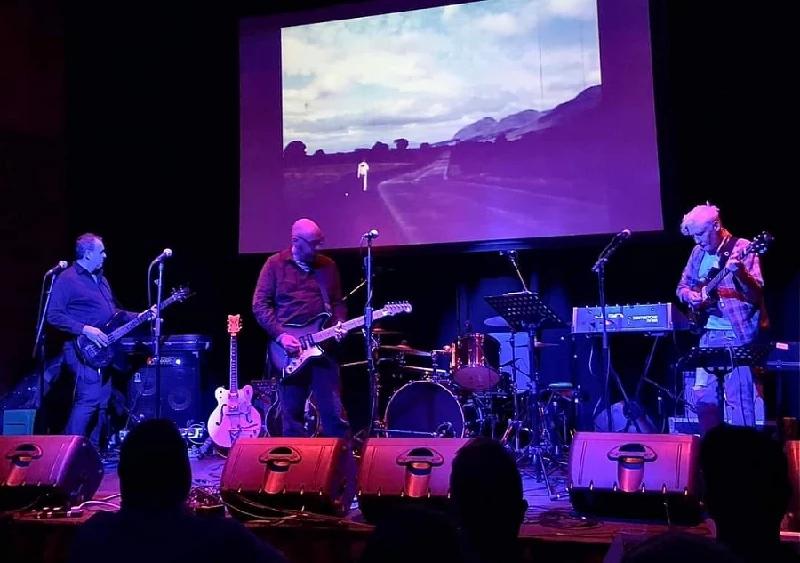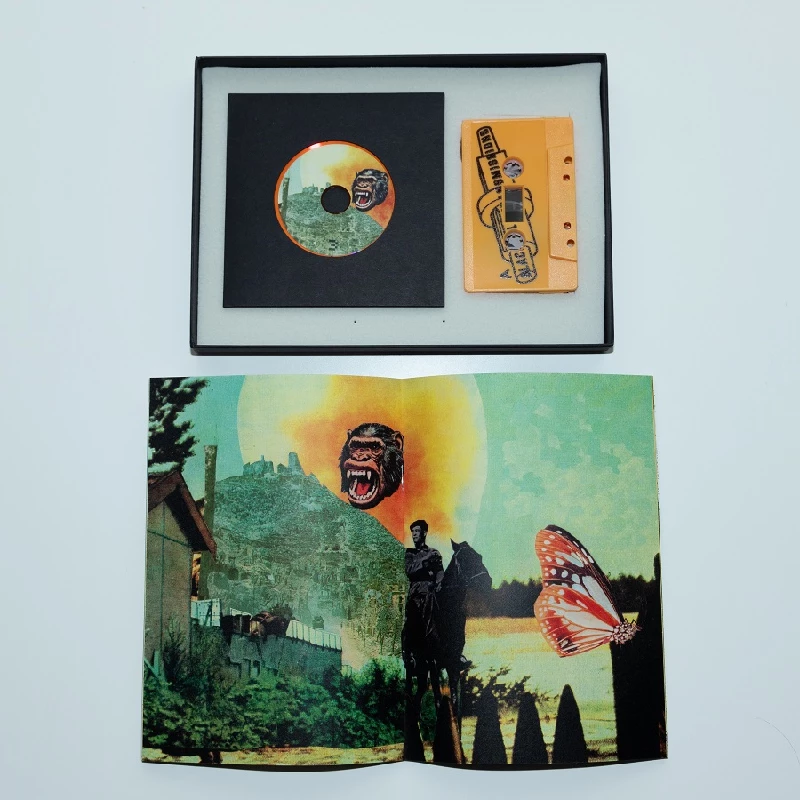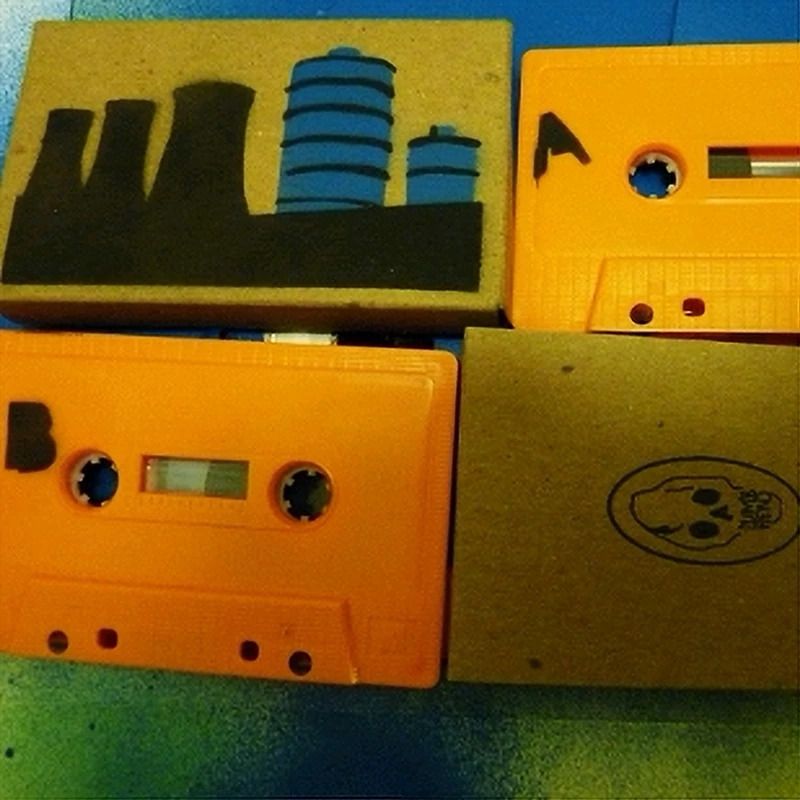Black Hill Transmissions is the project of North Lanarkshire experimental musician Mark Scanlan. Mashing up synthesisers and distorted guitars with occasional eerie vocals. Black Hill Transmissions has a haunting but frequently sinister sound. It has just released a new record, Transmissions ~3’, which follows on from two previous ‘Transmissions’ recordings and a charity EP ‘1985 In My Mind’. ‘Transmissions #3’ is a step-up for Scanlan being Black Hill Transmissions’ first LP rather than EP and taking him partially away from his lo-fi, bedroom roots by being mixed in Green Door Studios in Glasgow. Pennyblackmusic spoke to Mark Scanlan about Black Hill Transmissions and ‘Transmissions #3’. PB: You could be described as the missing link between Tangerine Dream and something much more extreme such as Suicide. Do you think that is an accurate description? MARK SCANLAN: I think there are some things I’ve done that sound like that – especially the more drone-y things (or even the vaguely pastoral ones?). I was listening to the ‘Sorcerer’ soundtrack a bit during lockdown but apart from that I don’t know Tangerine Dream really. I am more into organ sounds and I used over-the-top distortion in the first couple of ‘Transmissions’ which reminds me of Suicide but I don’t know their work too well. I like the idea of them a lot though. I’m into the unspecified feeling of threat, especially with a mixture of the music and video where some of the first Black Hill Transmissions music sprung from. PB: Black Hill Transmissions takes its name from the area between Edinburgh and Glasgow in North Lanarkshire in which you live, How much of an impact do you think your local environment has on your music? MS: Quite a lot, especially the first two ‘Transmissions’. Up on the high plains around Black Hill there is a nice mix of rural and post-industrial landscape, scattered farms and trees battered by wind; You are wandering around having just been dazzled by a Blue Jay flashing through the woods when you find yourself at the edge of a water-filled quarry with beer cans and a sheep’s skull floating on the surface, a burnt-out car at the edge of the trees. But it’s beautiful. PB: You have certainly used it to hypnotic effect on the video to ‘Last Walk to Blind Lake’, which shows you from the back walking in solitude around your local housing estate. You have described that track as “part Twin Peaks homage, part dubby Western theme.” Why do you say that? MS: I loved the video Stuart Hobbs made; it’s his old housing estate but he wanted me to wander about it’s now deserted streets. The track was much more like some twangy ballad when I made it up, like the kind of thing James would sing to Donna in 'Twin Peaks', but it has moved on – I became obsessed by echo/delay during the making of the track/album; almost everything has delay on it, directly inspired by listening to 70’s dub compilations which I discovered near the end of lockdown. When we were mixing the album I referenced dub bass, Fela Kuti organ sounds, and thin guitars like on Morricone westerns. This track has continued to develop, with a new ‘version’ already recorded by the live group, even more explicitly dub-influenced, and even more beautiful (imo). PB: You say in your notes that Transmission #3 is “music made quite quickly and without much thought for anything other than feel.” Why did you decide to choose to record it that way? MS: When I made music in the past, I made it on computers, often from other people’s music. I eventually stopped doing that, about 2012. When I was (re)activated during lockdown I knew I wanted to make music but not like before. Now, I make up a rough backing track and then using a 8-track portastudio improvise over it with lots of guitars, synths, bass etc until something good pops out. But I try not to agonise over the ‘sound’ or the ‘quality’ – I did the vocals on the first two ‘Transmissions’ on my phone, for example. I think my playing/recording skills are getting better – I think’ Transmission 3’ is much better than the first two. PB: Yet despite that, 'Transmission #3' has been a long time coming. You originally planned to release it in the middle of last year. Why has it taken so long to come out? MS: When lockdown happened I spent a lot less time commuting and a lot more time thinking creatively – I made paper collages, I wrote words, and I started recording music again, but I never really had a set-up so everything is rudimentary, which is fine by me. I did record ‘Transmission #3’ quickly and it was done last summer, but I decided I wanted it to sound as good as it could, so I mixed it in a proper studio – Green Door Studio in Glasgow with Samuel Joseph Smith, who did a great job pulling all its disparate parts together. Getting into the studio took a while though. I also am commuting again so my time is not as free as it once was – when it comes to creativity, time is more valuable than anything else. Saying that, I do have more new stuff coming soon. PB: You recorded three albums under the banner of Kobra Audio Labs between 2000 and 2010. Who were they? Why did you take such a long hiatus after that from making music and why did you decide to start up again? MS: A solo project which was about making collage/samplist music, it was pretty successful and allowed me to take my obsessions with hip-hop/beat-making as far as I could take them, but it was ultimately limiting. The best example of the music is ‘Two Blue Towers’ which contains two 25-minute long ‘tracks’ (in fact lots of splintered audio forced together). In 2012, I started to play more music ‘traditionally’, messing about with guitars and keyboards but not recording. I eventually linked up with Raymond Prior and Gavin Laird to improvise a soundtrack for Scottish underground film-maker Enrico Cocozza’s 1961 film ‘The Silver Trumpet’ and we played some live gigs around that in 2015. After that I spent eighteen months planning a multimedia event of Enrico Cocozza’s works after becoming obsessed by him. This was going very well and then lockdown happened… PB: 'Transmission #3' comes in two versions, a regular CD at £17 and a limited edition box set at £30. What additional material does the box set have? MS: You can just buy the music digitally too. That’s probably what I would do (£7). I really like making things though, and after the mixing was finished, I spent some time making a zine that collated the artwork/collages I made while I was making the music. That became a 32-page full-colour booklet that comes along with the CD bundle (£17). I continued making stuff though, resulting in the box set which contains the CD, the zine, a ‘bootleg’ tape which contains 40 minutes of collected audio made over the last 30-odd years, another mini-zine with tape info, and a postcard giving details of a forthcoming Black Hill Transmissions release. This is all collected in a recycled box complete with hand-made labels, inserts, and stamps. It’s a beautiful thing (£30) PB: You recorded a rather good covers charity EP, ‘1985 in My Mind’, which includes three tracks from 1985, The Shop Assistants’ ‘It’s Up to You’, The Jesus and Mary Chain’s ‘Just Out of Reach’ and New Order’s ‘Thieves Like Us’. Why was 1985 such an important year for you in terms of music and why did you decide to cover those particular tracks? MS: I first heard those tracks in 1985. I was fifteen and I loved them. A few years ago, I tried to record them from memory, I was somewhat successful, but it was more of a diversion than a serious thing. It raised a small amount of money for charity so that was good. PB;: You played a gig at the CCA in Glasgow in support of Port Sulphur at the launch for their album ‘Speed of Life’ last year. Was that your debut gig as Black Hill Transmissions? Do you plan to do more gigs? MS: Yes, I think so. We would love to - it is always tricky to make happen but watch this space. We have kept recording sporadically, and the ‘versions’ the group has made of some existing Black Hill Transmissions music is more exciting and interesting to me right now. PB: How does the live set=up of Black Hill Transmissions compare to the studio set-up? MS: The live set-up is a three-piece – Mark Scanlan (guitar, synth, programmed beats), Raymond Prior (bass), Gavin Laird (guitar) – and when getting ready for the CCA gig Gavin and Raymond started improvising over the programmed track, transforming my backing tracks in the process. Over this year the group have met and recorded four new ‘Versions’ of existing Black Hill Transmissions tracks, which should be released in mid-2024. PB: What plans does Black Hill Transmissions have for the future? Will there be a 'Transmissions #4''? MS: After ‘Transmissions #3’ I am planning two more releases in the next six months. ‘Oblique Views’ EP featuring 5 new tracks of dub-infecteded, noisy music. ‘Versions’ EP featuring 4 tracks of re-worked Black Hill Transmissions music with new bass, guitar, vocals etc from the live iteration of the group. I would like us to play some live gigs. PB: Thank you.
Band Links:-
https://www.facebook.com/profile.php?id=100066610460132https://blackhilltransmissions.bandcamp.com/album/transmission-3
Play in YouTube:-
Picture Gallery:-


''transmission #3' box set by Molly Smith

Kobra Audio Labs 'Two Blue Towers' cassette
intro
Experimental musician Mark Scanlan talks to John Clarkson about his project Black Hill Transmissions and its new release 'Transmissions #3'.
most viewed articles
current edition
Carl Ewens - David Bowie 1964 to 1982 On Track: Every Album, Every SongArmory Show - Interview with Richard Jobson
John McKay - Interview
Colin Blunstone - Thalia Hall, Chicago, 16/7/2025
Bathers - Photoscapes 1
Billie Eilish - O2 Arena, London, 10/7/2025
Loft - Interview
Visor Fest - Valencia, Spain, 26/9/2025...27/9/2025
Sir Tim Rice - Interview
Robert Forster - Interview
previous editions
Manic Street Preachers - (Gig of a Lifetime) Millennium Stadium, Cardiff, December 1999Heavenly - P.U.N.K. Girl EP
Beautiful South - Ten Songs That Made Me Love...
Peter Perrett - In Dreams Begin Responsibilities Interview Part One
Boomtown Rats - Ten Songs That Made Me Love....
Oasis - Oasis, Earl's Court, London, 1995
Coldplay - Wembley Arena. London, 16/8/2022
Prolapse - Interview
Trudie Myerscough-Harris - Interview
Pixies - Ten Songs That Made Me Love...
most viewed reviews
current edition
Davey Woodward - Mumbo in the JumboSick Man of Europe - The Sick Man of Europe
Lucy Spraggan - Other Sides of the Moon
Amy Macdonald - Is This What You've Been Waiting For?
Suzanne Vega - Flying With Angels
Blueboy - 2
Bush - I Beat Loneliness
Phew, Erika Kobayashi,, Dieter Moebius - Radium Girls
Alice Cooper - The Revenge of Alice Cooper
Cynthia Erivo - I Forgive You
Pennyblackmusic Regular Contributors
Adrian Janes
Amanda J. Window
Andrew Twambley
Anthony Dhanendran
Benjamin Howarth
Cila Warncke
Daniel Cressey
Darren Aston
Dastardly
Dave Goodwin
Denzil Watson
Dominic B. Simpson
Eoghan Lyng
Fiona Hutchings
Harry Sherriff
Helen Tipping
Jamie Rowland
John Clarkson
Julie Cruickshank
Kimberly Bright
Lisa Torem
Maarten Schiethart